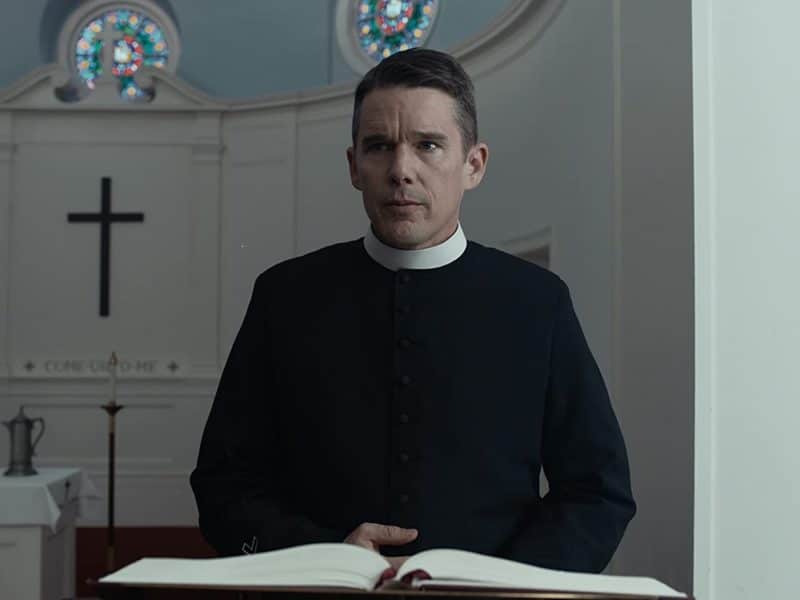Critics of the creative arts occasionally attempt their own artistic expression, while others try the reverse.
Hollywood filmmaker Paul Schrader was brought up in a strict Protestant household that banned access to movies and television. He studied movies in his university days, resulting in a 1972 book, Transcendental Style in Film. It focused on three masters of cinema, Japan’s Yasujiro Ozu (died 1963), France’s Robert Bresson (died 1999) and Denmark’s Carl Dreyer (died 1968).
Soon after, Schrader scored an early breakthrough with a screenplay for Sydney Pollack’s The Yakuza, a gangster story set in Japan and starring Robert Mitchum. This success was quickly followed by Taxi Driver (1976) for director Martin Scorsese. It was nominated for four Oscars, including best picture, and won Schrader a Golden Globe for best screenplay.
Raging Bull (1980), also for Scorsese, scored eight Oscar nominations, giving Schrader enough credibility to direct his own films. These were less successful than Scorsese’s, but showed a preparedness to deal with the more sordid side of American life.
Both he and Scorsese, a Catholic, had differing religious backgrounds, but both were interested in bringing theology to the screen, notably in their controversial The Last Temptation of Christ (1988).
In an updated edition of his book in 2018, Schrader notes that the transcendental style is not restricted to spiritual and religious themes. But it helps that they are based in the everyday and are neither too abundant nor sparse.
Examples would be Ingmar Bergman’s Winter Light (1962) and more recently Pawel Pawlikowski’s Ida. These contrast with the more visceral content of Schrader’s own Hollywood movies. These include at least three Nicolas Cage vehicles, Dog Eat Dog (2016), Dying of the Light (2014) and Scorsese’s Bringing Out the Dead (1999).
Finally, in his 74th year, Schrader has applied the transcendental aesthetic to First Reformed, which appeared in last year’s New Zealand International Film Festival and is now available on Netflix.
Superficially, it resembles the minimalist austerity of Ida – it is shot in the squarish academy ratio – but the producers insisted on colour.
In content, as the title indicates, First Reformed digs deep into Schrader’s Calvinist past. The story is set in upstate New York, where a Dutch Reformed church is about to celebrate its 250th anniversary. Its congregation has shrunk to a handful of worshippers and it survives on selling tourist souvenirs.
This is a strong contrast to the nearby revivalist mega-church, called Abundant Life, which has hundreds of followers and also broadcasts on TV. It is backed by a wealthy, but polluting, industrialist and is staging the anniversary.
The church minister (Ethan Hawke) lost his son in Iraq and his marriage has broken. He is afflicted with ill-health and is pushed to the edge when asked for advice by a young pregnant woman (Amanda Seyfried), whose eco-warrior boyfriend doesn’t want a baby born into what he sees as a world of destruction.
Schrader doesn’t resile from his Hollywood narrative habits, but his change of pace has produced a thoughtful contribution to religious cinema.
Netflix rating: 13+. 113 minutes.
CLIPS
Resistance
(Rialto Distribution)
The little-known heroism of French mime artist Marcel Marceau is told in this English-language production by Venezuelan writer-director Jonathan Jakubowicz, who is of Polish-Jewish descent. The young Marcel (Jesse Eisenberg), son of a kosher butcher, earns a living impersonating Charlie Chaplin as Hitler at a Strasbourg cabaret, just before the Nazi invasion in 1940. The French Jewish scouts organisation buys orphans from Germany and Marcel is adept at entertaining them, as well as creating false passports (hence his surname Mangel becomes Marceau). The population of Strasbourg flees to southern France, but the plight of the Jews worsens after the invasion. Marceau joins the Resistance, which is being hunted down by German commander Klaus Barbie, the arch-villain and one of the three main characters. Marceau was honoured at the end of the war for his role in rescuing orphans and went on to achieve international fame.
Rating: Mature audiences. 120 minutes.
The Vast of Night
(Amazon Studios)
A radio station, a manual telephone exchange and a small country town are the main ingredients of this imaginative sci-fi mystery set in 1950s New Mexico. That, of course, was also the home of UFO sightings and alien abductions that have spawned movies and documentaries ever since. Debut writer-director Andrew Patterson is clearly destined for higher things in his low-key account of how the radio announcer (Jake Horowitz) and the switchboard operator (Sierra McCormick) unravel the mystery of strange signals from outer space. Patterson uses a handful of long takes to advance the story through on-air calls and a sitting room monologue, a task the small cast does with ease. Coincidentally, the camera work is by M.I. Littin-Mentz, a Chilean who also did Resistance and is another talent to watch.
Amazon rating: 13+. 91 minutes.
Blow the Man Down
(Amazon Studios)
When their mother dies, two young adult sisters inherit a bankrupt shop at Easter Cove, a fictional fishing village in Maine. They squabble at the mother’s wake and the younger one spends a night with one of the town’s more shady characters (parallels with Bait, set in Devon). The man doesn’t survive and, in the cover–up, the women, played by Sophie Lowe and Morgan Saylor, find bad deeds quickly go from bad to worse. This is Coen brothers territory, with an Irish twist, as it includes a couple of murders, some ill-gotten cash, two easy-going cops, a coven of older women feigning respectability and a villainous madam. Co-writer-directors Bridget Savage Cole and Danielle Krudy, in their first feature, maintain a steady pace, helped by an experienced cast of older players. While the men are depicted as largely helpless amid the scheming females, the addition of sea shanty Greek chorus, featuring David Cronin, provides time for reflection.
Amazon rating: 16+. 91 minutes.

Reader Interactions